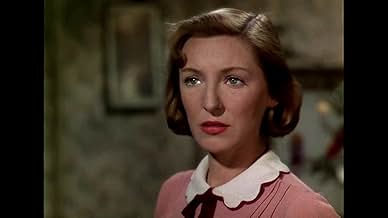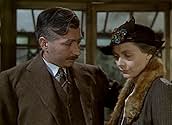CALIFICACIÓN DE IMDb
7.3/10
4.4 k
TU CALIFICACIÓN
Justo después de la Primera Guerra Mundial, la familia Gibbons se muda a una bonita casa en los suburbios. Llevan una vida normal a lo largo de los años, pero todo cambia cuando estalla la S... Leer todoJusto después de la Primera Guerra Mundial, la familia Gibbons se muda a una bonita casa en los suburbios. Llevan una vida normal a lo largo de los años, pero todo cambia cuando estalla la Segunda Guerra Mundial.Justo después de la Primera Guerra Mundial, la familia Gibbons se muda a una bonita casa en los suburbios. Llevan una vida normal a lo largo de los años, pero todo cambia cuando estalla la Segunda Guerra Mundial.
- Dirección
- Guionistas
- Elenco
- Premios
- 1 premio ganado en total
Robin Burns
- Man in Crowd
- (sin créditos)
Mabel Etherington
- Lady in Crowd
- (sin créditos)
Dan Lester
- Man in Crowd
- (sin créditos)
Jim Morris
- Man Operating Small Boats at Fairground
- (sin créditos)
Opiniones destacadas
Old-fashioned? Arch dialogue? Stiff acting? Viewable only as an historical document? Guilty on all counts, but this film still captivates. Made during the second World War, it was probably intended as a flag-waver, a morale booster for the worn-down citizens of Britain, but in fact is much more than that. The story (Noel Coward) deals with the lives and times of an ordinary family in 'between the wars' London. There is nothing dramatic, just the everyday events and the weddings, births and funerals that visit us all. However, there are some wonderfully quiet scenes - the father-to-son talk before the son's wedding is especially notable for its old-fashioned moral uprightness, the way the camera lingers in an empty room when the family learns of a terrible road accident, and Frank's gentle chat with his neighbour over a few glasses of whisky as they prepare to go their separate ways. Director David Lean handles these with care and reserve. The way the family deals with the mini-dramas that beset them was no doubt meant to say to the war-weary people that we may be a middling, grey little society with predictable ways, but it was worth fighting for. The film always leaves me a little melancholy, missing an age that still existed in many ways when I was a youngster. No doubt to a modern cinema audience that can't manage without an explosion or car-chase every ten minutes this would be regarded as dull and boring, but I love its charm.
What really boosts THIS HAPPY BREED into the "superior" category of British films is the direction by David Lean and the two central performances by CELIA JOHNSON and ROBERT NEWTON as the heads of a rather ordinary household living the provincial life between two World Wars. And what is surprising is that this '44 film from the U.K. uses Technicolor in an age when most films, unless they were spectacular musicals, were filmed in B&W. The color photography adds a handsome touch to the otherwise unspectacular story that is more a character study of a marriage and family relationships.
CELIA JOHNSON does a magnificent job as the mother who raises a daughter (KAY WALSH) unsatisfied with her family's social status, who yearns to rise above what she perceives as too provincial and runs off with a married man. It's just one of the many episodic tales in this domestic drama but it's played with such intensity by Johnson that the reunion scene toward the end is heartbreaking to watch.
All of the saga which stretches between the two wars is episodic, told in a series of vignettes which I imagine were done in blackout style on the stage, for which the tale was written. But Lean has successfully managed the transfer to the screen and all of the performances are top notch, particularly ROBERT NEWTON as the concerned father, JOHN MILLS as a man caught in an unrequited love affair and STANLEY HOLLOWAY who provides a good deal of comic relief as a boozy neighborhood friend of Newton.
Noel Coward evidently had more success in telling domestic tales with sharp observation of characters than Edna Ferber did with her own American sagas in which her characters seemed to get lost among all the vast territory she covered.
Summing up: Well worth watching for the performances alone.
CELIA JOHNSON does a magnificent job as the mother who raises a daughter (KAY WALSH) unsatisfied with her family's social status, who yearns to rise above what she perceives as too provincial and runs off with a married man. It's just one of the many episodic tales in this domestic drama but it's played with such intensity by Johnson that the reunion scene toward the end is heartbreaking to watch.
All of the saga which stretches between the two wars is episodic, told in a series of vignettes which I imagine were done in blackout style on the stage, for which the tale was written. But Lean has successfully managed the transfer to the screen and all of the performances are top notch, particularly ROBERT NEWTON as the concerned father, JOHN MILLS as a man caught in an unrequited love affair and STANLEY HOLLOWAY who provides a good deal of comic relief as a boozy neighborhood friend of Newton.
Noel Coward evidently had more success in telling domestic tales with sharp observation of characters than Edna Ferber did with her own American sagas in which her characters seemed to get lost among all the vast territory she covered.
Summing up: Well worth watching for the performances alone.
I throughly enjoyed this little gem of a film. It is very well acted and it was nice to see a smart well groomed Robert Newton being a million miles away from Long John Silver. It had some laughs,some drama and quite a bit of sadness and as you get to know the different characters you feel a genuine fondness for them. I was brought up in the 1950's and recall visiting relatives who had grandmas and spinster aunts living with them, just like in this film. Though there is bickering and some harsh words used by the family, it does represent a time when families stuck together and deep down loved and respected one another. If you get the chance to see this movie, then I am sure that you will enjoy it.
Whether or not, one agrees with the "truth or morality" of Noel Coward's ennobling view of the British "bourgeois" from 1919-1939, the acting and direction in "This Happy Breed", are superb, and what a cast. I think the notion of sacrifice, pride, and work ethic, might have easily been written about many similar low and middle income families in America from Brooklyn to San Francisco, during the same period, as it was portrayed in the equally, excellent film, "Best Years of our Lives" (1946)
This film caught me completely unawares. I had never heard of it until it presented itself on daytime television one afternoon. I really dislike this type of film, as I find most of the time is spent on mediocre happenings in predictable situations. (Ordinary peoples lives are very boring). I was therefore amazed at the fact that I couldn't leave it, Maybe it's because I am getting older or maybe the people in this film reminded me of the adults of the 1950's when I was a child.
The acting is absolutely superb, you really believe in this family and the ups and downs of their lives. The direction of David Lean polishes the excellent cast performance, what more can I say ! ......Fantastic.....
The acting is absolutely superb, you really believe in this family and the ups and downs of their lives. The direction of David Lean polishes the excellent cast performance, what more can I say ! ......Fantastic.....
¿Sabías que…?
- TriviaThe voice of the uncredited opening narrator is that of Laurence Olivier.
- ErroresFrank is shown reading a copy of the 16 September 1930 edition of the Daily Mirror with the headline story about the elections in Germany held on 14 September where the Nazi Party increased their seats in the Reichstag from 12 to 107. He then goes to the back yard to help shake out the tablecloth, but the cherry tree there is still in full bloom, months after the blossoms should have disappeared.
- Citas
Frank Gibbons: She didn't pass on, pass over, or pass out! She died!
- Créditos curiososOpening credits prologue: This is the story of a London family from 1919 to 1939.
- ConexionesFeatured in Jonathan Ross' Must-Watch Films: Crime Films (2023)
- Bandas sonorasRule Britannia
(uncredited)
Lyrics by James Thomson
Music by Thomas Augustine Arne
Sung by Robert Newton (Frank) and Stanley Holloway (Bob) coming home after their reunion
Selecciones populares
Inicia sesión para calificar y agrega a la lista de videos para obtener recomendaciones personalizadas
- How long is This Happy Breed?Con tecnología de Alexa
Detalles
- Fecha de lanzamiento
- País de origen
- Idioma
- También se conoce como
- Srecna porodica
- Locaciones de filmación
- Alderbrook Road, London, Greater London, Inglaterra, Reino Unido(exteriors of family house near corner with Bellamy St. - still standing in 2022)
- Productoras
- Ver más créditos de la compañía en IMDbPro
Taquilla
- Presupuesto
- GBP 200,000 (estimado)
- Total a nivel mundial
- USD 158
- Tiempo de ejecución1 hora 55 minutos
- Relación de aspecto
- 1.37 : 1
Contribuir a esta página
Sugiere una edición o agrega el contenido que falta

Principales brechas de datos
By what name was This Happy Breed (1944) officially released in India in English?
Responda


















